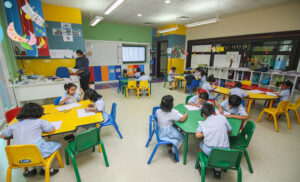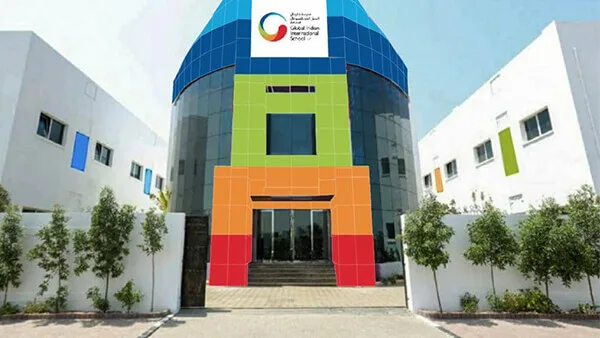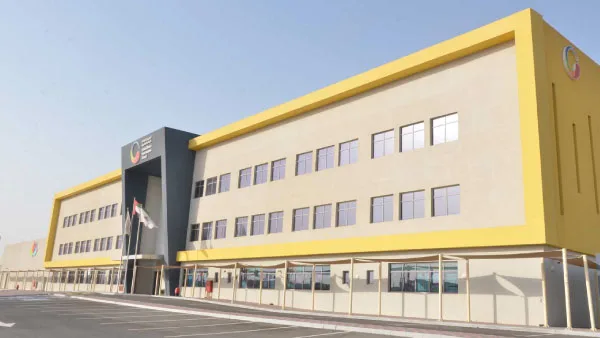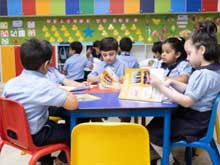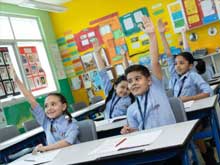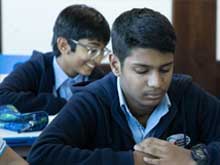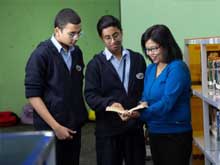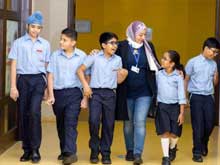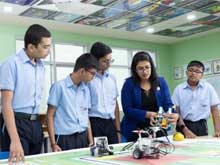Being informed about the CBSE syllabus of Class 11 is important for students as the syllabus is prone to change every year. It also helps students to begin studying in time for their exams that are conducted in two phases: Term 1 and Term 2.
Moreover, as some of the topics from the syllabus have been deleted, it is important for students to be aware of the changes. Indian high school shares the syllabus early on as it helps the students know the topics they need to focus on and the topics they can skip.
We bring you the detailed CBSE class 11 syllabus of English and the science stream for terms 1 and 2. Students can check out the syllabus for the commerce and humanities streams at the GIIS website.
The syllabus will help students begin learning and preparing right away. It will also help them recognize their strengths and weaknesses and work on the topics they find difficult.
CBSE Reverts to Single-Board Exam Format
Now that the schools are functioning normally, CBSE has planned on reverting to the single-board exam format from 2022-23 onwards. This format will be similar to the one followed in pre-pandemic times.
Earlier, it followed the dual board policy, where the syllabus was divided into two parts which were the basis of two board exams. These board exams were conducted in November-December and March-April, respectively.
However, due to the Covid-19 situation, it had to be canceled and the students were evaluated based on their internal assessments, projects, and practical exams.
This year onwards, the exams will be conducted from April 26th onwards and the 2nd term board exam will carry more weightage than the 1st term exams.
Objectives of the CBSE Syllabus
Some of the objectives of the CBSE syllabus are:
● The CBSE syllabus aims to help students get clarity about the course framework and understand the important topics.
● The syllabus plays the role of a guide to the students, too. This is because students can refer to it regularly and check the progress they make.
● The CBSE class 11 syllabus contains information on projects, practicals, and assignments that the students need to complete.
● Students also discover their strong points and weaknesses by checking the syllabus and start preparing accordingly. They get the time to concentrate on the topics they find difficult and thus improve their performance in the final exams.
● Being aware of the syllabus of class 11 helps students understand the examination format and the marking pattern and stay well-prepared for the final board exams.
How to Prepare for the CBSE Board Exams?
Students usually begin preparing for their final exams many months in advance. But, as the pressure to perform is huge and can take a toll on their mental health, we bring you some helpful preparation tips for the CBSE Board exams.
The private international school Abu Dhabi shares these tips with students to help reduce stress and stay well-prepared and confident for their exams.
● It is important to know the syllabus thoroughly well before beginning the preparation. So, go through the entire syllabus before you begin working on a subject.
● Make a list of easy topics and those that you find challenging. This will help you know which topics need more time and which need less. You can thus concentrate more on the tougher topics and ask for any help or guidance that you may need.
● Before you start preparing, make sure you have all the required study material.
● Use the NCERT books for class 11 to practice and prepare first and refer to the NCERT solutions whenever you need to.
● Use various reference books to practice as many questions as possible.
● To better understand the question pattern, do refer to the previous year’s question papers. This will also help you understand the difficulty level of the questions and work on the topics accordingly.
● Mock tests are very useful when preparing for the class 11 final exams. This will help you know the topics that need your attention more.
● Take short breaks during study time. This helps you stay fresh and energized all day. Do pay attention to your water intake and your diet. Make sure you eat healthily and stay well-hydrated.
Also, pursue a hobby that will help you stay emotionally fit while you prepare for your exams. Remember, that your health matters most!
What is the Syllabus of Class 11 CBSE?
We share with you the revised and reduced CBSE syllabus. The 2nd term exam covers 50% of the syllabus. Please check the weightage of every unit of the 2nd term exam. Before preparation, understanding this syllabus will help you strategize wisely and plan your studies.
The CBSE class 11 syllabus is very comprehensive and unlike any other syllabus. Study it well to understand the important topics, which will help you score better.
Also Read: Factors Affecting Academic Performance
CBSE Syllabus Subject Wise
CBSE Class 11 English Syllabus
Term 1:
| Section A | Reading Comprehension |
|
| Section B | Grammar and Creative Writing |
|
| Section C | Literature |
|
Term 2:
| Section A | Reading Comprehension |
|
| Section B | Grammar and Creative Writing |
|
| Section C | Literature |
|
What is the Syllabus of Class 11 CBSE?
CBSE Class 11 Maths Syllabus
Term 1:
| Unit 1 | Sets and Functions |
|
| Unit 2 | Algebra |
|
| Unit 3 | Coordinate Geometry |
|
| Unit 4 | Calculus |
|
| Unit 5 | Statistics and Probability |
|
Term 2:
| Unit 1 | Sets and Functions |
|
| Unit 2 | Algebra |
|
| Unit 3 | Coordinate Geometry |
|
| Unit 4 | Calculus |
|
| Unit 5 | Statistics and Probability |
|
CBSE Class 11 Physics Syllabus
Term 1:
| Unit 1 | Physical-world and measurement |
|
| Unit 2 | Kinematics |
|
| Unit 3 | Laws of Motion |
|
| Unit 4 | Work, Energy, and Power |
|
| Unit 5 | Motion of system of particles and rigid body. |
|
| Unit 6 | Gravitation |
|
Term 2:
| Unit 7 | Properties of bulk matter |
|
| Unit 8 | Thermodynamics |
|
| Unit 9 | Behaviour of perfect gases and the kinetic theory of gases |
|
| Unit 10 | Oscillations and Waves |
|
CBSE Class 11 Chemistry Syllabus
Term 1:
| Chapter 1 | Some basic concepts of Chemistry |
| Chapter 2 | Structure of atom |
| Chapter 3 | Classification of elements and periodicity in properties |
| Chapter 4 | Chemical bonding and molecular structure |
| Chapter 5 | Redox reactions |
| Chapter 6 | Hydrogen |
| Chapter 7 | Organic Chemistry – Some basic principles and techniques |
Term 2:
We share with you the reduced syllabus of class 11 Term 2 Chemistry.
| Chapter 1 | States of Matter: Gases and liquids |
| Chapter 2 | Chemical Thermodynamics |
| Chapter 3 | Equilibrium |
| Chapter 4 | s-Block Elements |
| Chapter 5 | p-Block Elements |
| Chapter 6 | Hydrocarbons |
So the above-listed syllabus were for Science stream students. If you want to get information about the Commerce & Humanities stream then you can either check the GIIS CBSE curriculum page or the official CBSE website. I hope this blog will help you prepare better for class 11. Happy learning!





